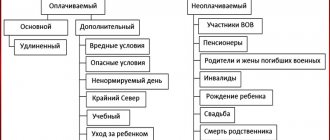Home / Labor Law / Payment and benefits / Maternity payments
Back
Published: 05/06/2016
Reading time: 7 min
0
7391
Russian legislation provides for the mandatory receipt of maternity benefits by pregnant women . However, there are a number of reasons why an employer or the Social Insurance Fund may deny a woman this right. In this case, a woman can protect her rights in the labor inspectorate, the prosecutor's office or in court.
Pregnant women today are protected by the state more than ever. That is why women in an “interesting” position are guaranteed to receive paid maternity leave.
- Deadline for paying maternity benefits
- For what reasons may an employer not pay maternity benefits? Liquidation of an organization
- Bankruptcy of the organization or a difficult financial situation that makes any social payments impossible
- Maternity pay was paid to an employee who was recently hired
Who can receive benefits?
Order of the Ministry of Health and Social Development No. 1012 of December 23, 2009, fall into the following categories can count on it :
- Women registered as an individual entrepreneur and paying insurance premiums at their own request for at least six months.
- Those who have lost their jobs due to the liquidation of a company or the termination of the activities of an individual entrepreneur, as well as those suspended from work as a notary or lawyer and not officially recognized as unemployed for the current year.
- Officially employed and having an insurance policy with the Social Insurance Fund.
- Voluntarily insured and paying insurance premiums on time.
- Women who perform military service or are employees of the police department, drug control, and the Ministry of Emergency Situations.
- Full-time female students of higher educational institutions.
- All of the above are citizens who have adopted a child under three months old.
REFERENCE. Women who do not officially work anywhere and are not registered with the employment center will not be paid maternity benefits.
Reasons for payments
The main basis for payment of maternity benefits is maternity sick leave. In addition to it, there is a list of documents required for the assignment and payment of benefits.
The list of required papers was approved by Federal Law No. 255 of December 29, 2006 “On Compulsory Social Insurance...” and looks like this :
- a pregnant woman’s application for benefits, drawn up in writing and in any form;
- sick leave certificate issued by the attending physician from the antenatal clinic;
- certificate of earnings required when calculating benefits.
Additionally you may need:
- information about the bank details of the card or account where maternity payments can be transferred;
- when applying to the Social Insurance Fund, you will need a completed form 4-FSS, indicating the date of maternity leave and the required payments, calculated by the employer’s accountant;
- certificate of absence of payments from the Social Insurance Fund for the employer and vice versa.
IMPORTANT. Documentation can be sent by e-mail or regular mail, putting not the original papers, but their certified copies.
What measures should be taken if maternity benefits are not paid on time?
Many employees wonder what to do if the company does not have a special form for drawing up an application for benefits during maternity leave. This official paper does not have any special rules and regulations; it is drawn up like all other statements and has the same structure and form.
Expectant mothers do not have to make a special application to the Social Insurance Fund. Everything can be formalized at the enterprise where the girl is officially registered. The company's management accepts a statement indicating that the woman is preparing to go on maternity leave. This document is the basis for taking further steps to apply for benefits and make extracts. If the girl did not perform certain actions on time, then there is no point in waiting for benefits on time.
Duration of sick leave
According to laws No. 255-FZ of December 29, 2006. and No. 81-FZ dated May 19, 1995. The Labor Code of the Russian Federation establishes the number of calendar days of maternity leave indicated by the attending physician on the sick leave certificate of the mother in labor.
The number of days of incapacity and maternity leave is determined according to the following criteria:
- singleton pregnancy and one child is born - 140 days of sick leave (70 days before and 70 after birth);
- in case of complicated childbirth, 16 days of leave are added to the postpartum period;
- in case of premature birth, 156 days of rest are prescribed;
- for a woman carrying 2 or more children, sick leave is issued at 28 weeks and leave before childbirth is 84 days, and after - 110, but if a multiple pregnancy is detected only during childbirth, leave for the postpartum period is extended to 124 days;
- if a woman in labor lives in a radiation-contaminated area, her prenatal leave is extended to 90 days;
- when adopting a newborn, the guardian receives leave until the child is 70 days old, but if he has adopted several babies at once, it is extended to 110 days.
REFERENCE. A sick leave certificate must be issued to a woman in labor no later than the 30th week of pregnancy, and in case of premature birth, from the 22nd week.
At the request of the woman, a certificate of incapacity for work can be issued later if she continues to officially work.
When are maternity benefits paid: before or after childbirth?
In what terms must maternity pay be paid according to the legislation of the Russian Federation?
According to the law, an employer must accrue and pay maternity benefits only after a pregnant woman submits a sick leave certificate to an accountant and writes an application to receive it in her own hand.
The company must make the payment in full; partial payment of accrued money is not allowed . Usually, the expectant mother receives the required maternity payments even before giving birth.
Expectant mothers are often concerned with the question of how many days after taking sick leave are maternity benefits accrued and paid?
Article of the law, or rather order of the Ministry of Health and Social Development No. 1012 clause 18 of December 23, 2009. approves the procedure for paying financial assistance to the expectant mother within ten calendar days . These are the standard terms for payment of sick leave.
In the event of unforeseen situations in the form of complicated childbirth and the provision of official documents confirming this, the woman in labor will be able to receive additional payment in the accounting department of her enterprise for officially extended sick leave.
ATTENTION. When a woman is officially employed by two employers at once for two years, she has the right to receive maternity benefits from each of them.
Why may an employer not pay maternity benefits?
The legislation provides for the obligation of each employer to pay maternity benefits if the enterprise operates and wages are paid as normal. Taking into account this wording, in practice, refusal to accrue benefits for labor and labor and newborn care may be carried out in connection with:
- Liquidation of the enterprise - if the liquidation procedure has been launched, then it is assumed that the employment relationship with all employees, including pregnant women, will be terminated. In this case, all payments due to dismissed employees are made by the local branch of the Social Insurance Fund.
- Bankruptcy of the company - if the employer is declared bankrupt in the prescribed manner, then he does not have the financial ability to accrue maternity benefits to the employee. In this case, these funds will be transferred to her by the local branch of the SZN. This applies to both sick leave benefits and newborn care benefits.
- The inability to determine the location of the employer - in this case, there is also often a seizure of his property. A pregnant woman can only get her money through legal action. Having received the writ of execution, she will be able to contact the enforcement service, where a decision will be made on the procedure for collecting funds.
How long does the Social Insurance Fund transfer maternity benefits?
According to the law, in accordance with the Decree of the Government of the Russian Federation No. 294 of April 21, 2011, a list of regions of the country for which the “pilot project” operates has been approved. Its result is the receipt of maternity benefits directly from the Social Insurance Fund, and not from the employer. The woman submits all the documentation necessary to receive benefits to the employer, and writes an application for the Social Insurance Fund.
The employer of the future woman in labor must send a package of documents to the Social Insurance Fund within 5 days, and they, in turn, must make a decision on payment within 10 days. The Social Insurance Fund transfers maternity benefits to the current account until the 26th of the next month .
According to Article 12 of Federal Law No. 255, it is possible to apply for maternity money only within six months after the end of maternity leave. If a woman does not provide the required package of documents within the specified period, she will not be able to receive financial assistance.
Going to court
Although the mechanism for appealing a refusal to the prosecutor's office or local labor inspectorate is established by law, in practice they do not have a real effect.
The labor inspectorate can at most issue a warning to the employer or fine him, which has no meaning for a pregnant or postpartum woman. The prosecutor's office, in turn, is authorized to conduct an audit of the activities of the employer, as well as the social service. However, the prosecutor's office has no real tool to influence their decisions. It can only notify the relevant structures about the fact of an offense and bring the perpetrators to justice. And for the victim there will be no financial benefit from this. The prosecutor's office can only defend her at trial.
So what should you do to get your rightful money? For this reason, the most effective mechanism is considered to be judicial resolution of the issue.
To go to court, you must prepare the following documents:
- sick leave issued by an authorized medical organization;
- an application sent to the employer or social service to receive maternity benefits;
- certificate of salary for the previous 2 years.
Practice shows that in more than 80% of such disputes, if all the above documents are available, the court makes a decision in favor of the woman. As a rule, neither the employer nor the social service is usually involved in the voluntary execution of court decisions, so you have to additionally contact the bailiff service, which is authorized to enforce judicial acts.
As a rule, with the participation of bailiffs, payments are made quickly and on time. You can also recover funds withheld for the period of maternity leave that were not paid.
The protection of workers' rights is one of the priorities in labor legislation, which is supported by judicial practice. So pregnant women who have been refused the assignment or payment of maternity money should not think about what to do and what methods to solve the problem to use, but it is better to immediately go to court. This is the fastest and surest way to receive the due maternity payments.
Is it possible to refuse payment from the Social Insurance Fund and what to do in this case?
The Social Insurance Fund may refuse to reimburse the employer of a woman in labor if:
- Education does not correspond to the position.
- The wages are clearly too high.
- The benefit was accrued, and the woman continued to work (Article 7, Clause 1.1 of Federal Law No. 165).
- The position was introduced specifically before hiring a pregnant woman.
Organization, according to Art. 64 of the Labor Code of the Russian Federation, does not have the right to refuse to hire a pregnant woman only because of her situation, and the Social Insurance Fund cannot refuse payment due to the employment of such a woman.
If you refuse, you should first double-check the correctness of the calculation of benefits and the issuance of a certificate of incapacity for work . If the papers are in order, you can contact the judicial authorities, according to Art. 4.6 part 6 of Federal Law No. 255, and provide evidence that the company needed this employee, and her education and experience correspond to the position held.
Arbitrage practice
The judicial practice of such situations is quite extensive.
As a rule, after a comprehensive and objective study of the materials, the court satisfies the demands of the young mother, for example, the decision of the Khabarovsk District Court dated 07/05/2017 in case No. 2-1348/2017, the decision of the Babushkinsky District Court of Moscow dated 03/30/2016 on case No. 2-1725/16.
Failure to pay maternity benefits (maternity benefits) is illegal. In any case, the employer is obliged to carry out these accruals and pay them. If a woman was fired due to the liquidation of the company, she has the right to apply for payment directly to the Social Insurance Fund.
Can payment be delayed?
Required payments must be made before or during the next payment of wages at the enterprise. Subsequently, the company's expenses will be reimbursed from the Social Insurance Fund.
If the Social Insurance Fund delays the payment of maternity benefits , you need to establish the reason for the delay by contacting the department that is supposed to make the payment.
If the benefit is paid by the employer, then the organization may delay the payment of maternity benefits in order to temporarily use the Social Insurance Fund budget funds for its own purposes. Also, late payment of money may be a consequence of insufficient funds in the company’s account.
Maternity payments are delayed: what to do and where to go?
If the refusal to issue money is delayed and management does not respond to the employee’s claims, you can contact the labor inspectorate with a complaint or the Social Insurance Fund.
The next step in resolving the issue will be filing an application with law enforcement agencies or the prosecutor's office. The final decision will be to appeal to the judiciary if the above authorities did not influence the solution of the problem in any way. Usually, the court is on the side of the employee and maternity money will be paid to her soon .
The rights of mothers are protected at the state level and every woman should clearly know them and be able to use them to protect her interests and the future or already born child.
Out-of-court procedure for appealing a refusal to pay maternity benefits
An out-of-court procedure for appealing a refusal to provide maternity benefits does not seem to be a very effective method of protecting rights. However, such a mechanism is provided, and those affected by the actions of the employer or social service can use it, which is much easier than going to court. The issue can be resolved outside of court in the following cases:
- when the employer’s organization provides for a procedure for appealing the actions of a subordinate manager to a superior one;
- when the enterprise has a trade union;
- to the head of the social service or to a higher department.
The procedure for such an appeal, when maternity leave is not paid, is usually provided for by local acts of the enterprise and establishes that each employee has the right to consider the dispute with the participation of the labor commission and the trade union organization of workers. When the internal acts of the enterprise stipulate that the decision of such a commission is mandatory, then it may not be necessary to go to court.
The organization that makes such a mechanism possible usually receives a tax bonus. However, not every employer can boast of having a trade union organization or similar democratic internal rules. So, female workers in small industries and small enterprises should not hope for success, since for such employers all decisions are made by the manager, regardless of internal rules.
Unfortunately, the actions of the labor inspectorate and the prosecutor's office do not produce the desired effect. In most cases, they are limited to only comments and warnings, which for women cannot be called a solution to the problem. For this reason, the most effective way to protect your rights if maternity leave is not paid is to go to court.









